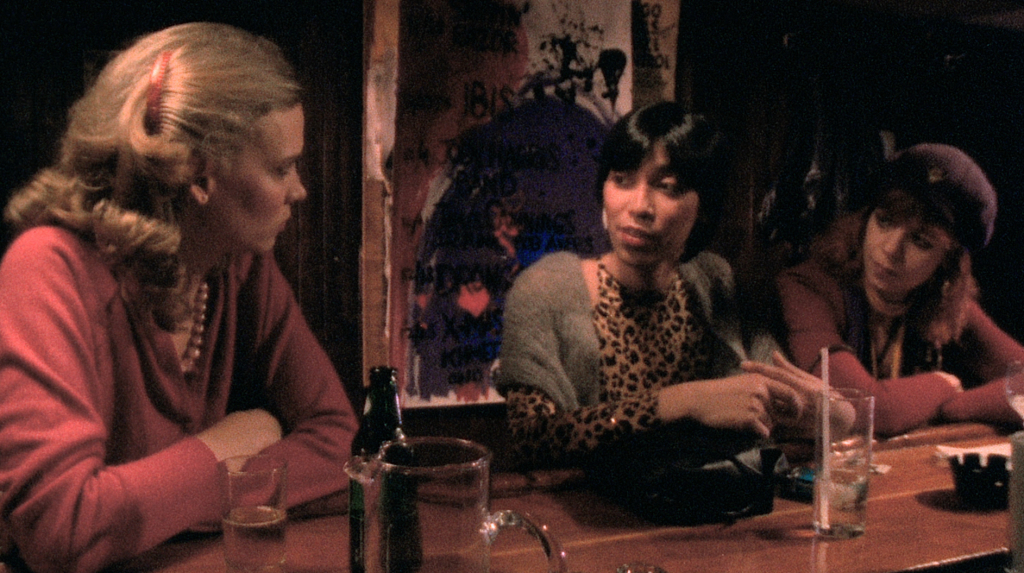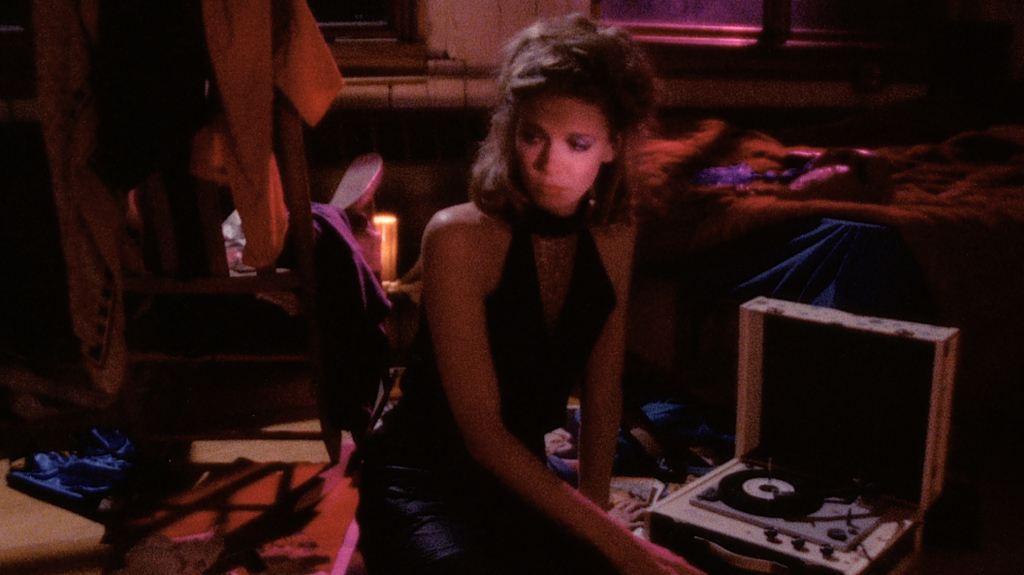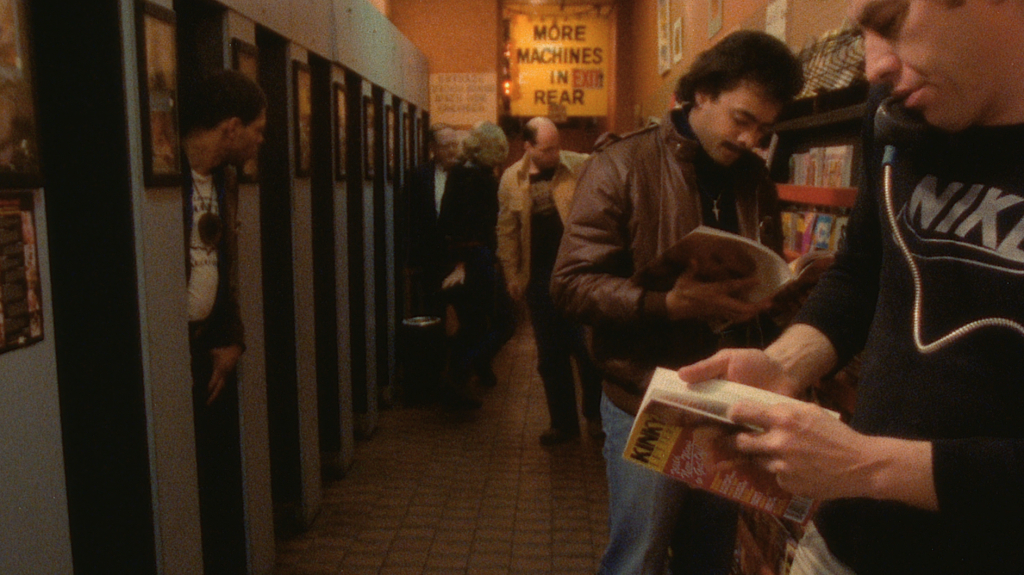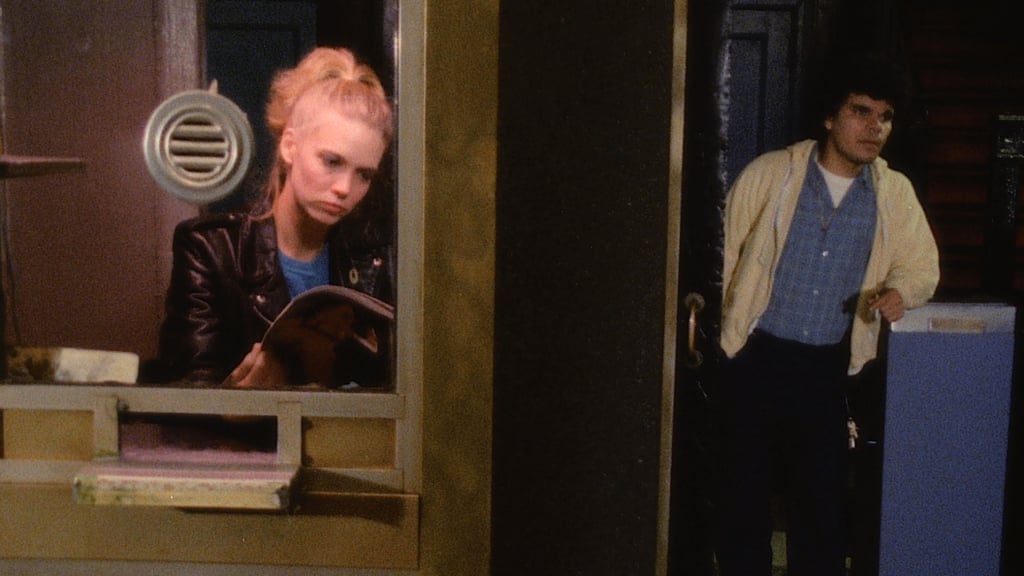When exploring Bette Godon’s 1983 debut feature film Variety, context is key to understanding how subversive the picture truly was. New York City was recovering from the recession of the 1970s and Times Square was nothing like the tourist trap that it is today. Instead, the area was replete with skeezy sex shops and porno theaters everywhere you looked. This was also a time when the feminist movement was split into different factions when it came to the depiction of women on film, especially in porn. Many believed that any instances in which women were used as objects for the patriarchal gaze was simply unacceptable. Some revolutionary filmmakers, such as Gordon, believed that the issue of nudity and what was portrayed on screen was not as much of an issue as who was controlling the narrative. Would it really be fair to forbid tales of women exploring their sexuality just because men are massive horndogs? Gordon gave a middle finger to convention and crafted a daring tale that resonates nearly forty years later.
Variety follows the journey of Christine (Sandy McLeod), a sweet twenty-something who has recently relocated to Manhattan with a liberal arts degree. Christine is in desperate need of a job and is quickly running out of options as she struggles to pay her rent. When her friend Nan (Nan Goldin) tells her about an opening selling tickets at a local adult movie theater, she seizes the opportunity out of a mixture of necessity and curiosity. The job is not difficult, and she gets a front row seat to a side of society that is completely foreign to her. Most of the clientele leave her be, choosing to scurry away in shame into the darkness of the theater for the most part. Even if they were to get fresh, she usually has her jovial coworker Jose (Luis Guzman) nearby to handle business. During her time at the theater, something begins to change inside of Christine. It starts by being drawn in by the sounds of the manufactured ecstasy onscreen, and grows into a fixed obsession of the art form and those who frequent the films. Christine is fascinated with getting in touch with her inner-voyeur.

What Christine is beginning to experience is not necessarily about the eroticism that is present in her new world. Christine is stimulated by the inherent power that she seizes by invading spaces that are not typically intended for her. It starts when she barges into the projection booth at the theater, and she slowly expands out to other sex shops and typically male meeting places in the area. She is an intruder in the lives of these men, and they are visibly thrown off by her mere presence. These strangers are not the only people wary of her new situation; Christine’s boyfriend Mark (Will Patton) can not wrap his head around her newfound boldness. When Christine attempts to read him a sexually charged story that she has been inspired to write, his pointed discomfort reveals him to be something of a secret sexist. Women can be as liberated as they want to be, as long as they do not make men uncomfortable.
Christine gets drawn in by a patron of her theater, Louie (Richard Davidson), a middle-aged businessman who asks her out on a date, to which she surprisingly agrees. Although the date is cut short when Louie is called away on business, the night still continues for Christine as she secretly follows him to various locations where it becomes clear he is involved with the mob. This voyeurism fuels an obsession that leads her down some complicated roads which take her on a harrowing journey. The film is a perfect representation of how you establish mood and tone through visuals. Gordon employs long tracking shots filled with little-to-no-dialogue that keeps you on edge. There are times where you feel these could have been trimmed slightly, but it all feeds toward engrossing you in this dream-like reality. If this film falters in any respect, it is the lack of a defined conclusion. I respect that Gordon wanted to leave things for the audience to decide, but it does not make what we got any less frustrating. Nevertheless, Variety is a truly impressive debut feature that thrives in its independent spirit with fantastic performances and deft filmmaking. Gordon bucked convention with this tale, and she showed that not all feminist can be put in the same box.

Video Quality
Variety comes to Blu-Ray with a new digital AVC encoded 1080p transfer derived from a 2K restoration of the original camera negative overseen by director Bette Gordon. The presentation is simply gorgeous throughout most of the runtime, giving this low-budget affair a vitality that it has never been afforded previously. Instances of print damage have all but been eradicated, and overall clarity and detail is stunning. This transfer maintains the natural film grain of the presentation that should not be mistaken for digital noise. This film grain allows for some excellent textural details in the various settings of the film. The picture can run slightly soft in long shots, but colors are well saturated in a visually splendid way. Skin tones are natural and consistent with subtle facial features easily noticeable in closeup. Black levels hold up well with very little in the way of crush. This new presentation is very impressive on all levels, which should please fans of the film.
Audio Quality
The Blu-Ray disc comes with a DTS-HD 2.0 Master Audio track that represents this film as it was intended to be heard. The music from John Lurie sounds great throughout the duration of the film, as it creates a sparse, dreamy tone for the film. There is never a moment where it threatens to overwhelm competing sounds, and it maintains a good balance so that dialogue comes through clearly. Environmental sounds such as the busting sounds of the city are rendered well alongside everything else. There does not seem to be any majorly noticeable instances of age-related wear and tear. Kino Classics has given this film the perfectly preserved, faithful audio presentation it so richly deserves. Optional English (SDH) subtitles are provided on this disc.

Special Features
The Blu-Ray of Variety includes a multi-page booklet featuring the essay “Once Upon A Time In NYC” by film critic Amy Taubin. The essay provides a great amount of cinematic context to the film, analyzes plot points in-depth and gives some background on the state of feminism at the time. The on-disc special features are as follows:
- Audio Commentary: Writer Hillary Weston moderates this track with director Bette Gordon which is very informative from a production and narrative standpoint. Weston asks some very incisive questions that keeps the information flowing throughout the track. Gordon discusses her inspiration from Hitchcock, Bogdanovich and more, gives in-depth details from shooting the film, and analyzes some of the themes in the film. Gordon’s thoughts on the ending of the film and how it connects to the lack of gratification in porn actually made me appreciate it a bit more.
- Anybody’s Woman (1981): An eighteen-minute short film from Bette Gordon which serves as something of a precursor to Variety, even going as far as having the memorable story that Christine recites to Mark in the film. The quality of the presentation is great, and the short is an engaging bit of content that should be appreciated by fans of the film.
- Gallery of Production Stills: An assortment of behind-the-scenes stills from the production of the film as shot by Nan Goldin.
- Location Scouting Stills Gallery: An assortment of stills from when the creative team was looking for shooting locations during pre-production as shot by Bette Gordon.
- Storyboard Illustration Slideshow: An assortment of storyboard illustrations as illustrated by Tim Burns and Bette Gordon.
- Variety Trailer: A two-minute trailer that sells the general story, but does not really capture the tone of the film.
- Luminous Motion Trailer: A minute-and-a-half-long trailer of Gordon’s 1998 drama also out from Kino Classics.
Final Thoughts
Bette Gordon’s debut feature Variety is an engaging look at burgeoning female sexuality and empowerment as portrayed through a female lense. This independent labor of love is quite fascinating throughout with some impressive moments of filmmaking. Kino Classics has delivered an outstanding new Blu-Ray featuring an wonderful A/V presentation as some worthwhile special features. If you are looking for an interesting neo-noir that transports you to the dirty New York of the early eighties, be sure to check this one out. Recommended
Variety is currently available to purchase on Blu-Ray and DVD.
Note: Images presented in this review are not reflective of the image quality of the Blu-Ray.
Disclaimer: Kino Classics has supplied a copy of this disc free of charge for review purposes. All opinions in this review are the honest reactions of the author.

Dillon is most comfortable sitting around in a theatre all day watching both big budget and independent movies.






